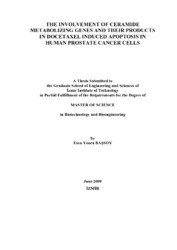Please use this identifier to cite or link to this item:
https://hdl.handle.net/11147/3699Full metadata record
| DC Field | Value | Language |
|---|---|---|
| dc.contributor.advisor | Baran, Yusuf | en |
| dc.contributor.author | Başsoy, Esen Yonca | - |
| dc.date.accessioned | 2014-07-22T13:52:10Z | - |
| dc.date.available | 2014-07-22T13:52:10Z | - |
| dc.date.issued | 2009 | en |
| dc.identifier.uri | http://hdl.handle.net/11147/3699 | - |
| dc.description | Thesis (Master)--İzmir Institute of Technology, Biotechnology and Bioengineering, İzmir, 2009 | en |
| dc.description | Includes bibliographical references (leaves: 47-54) | en |
| dc.description | Text in English; Abstract: Turkish and English | en |
| dc.description | xi, 54 leaves | en |
| dc.description.abstract | Patients diagnosed with prostate cancer initially respond to androgen ablation therapy with tumor cells undergoing apoptosis, but then the patients relapse in time and develop metastatic, androgen independent prostate cancer. Docetaxel has been widely used for treatment of patients with advanced metastatic prostate cancer. The sphingolipid, ceramide, is a lipid second messenger that mediates a lot of functions as regulation of cell growth, proliferation, differentiation, senescence and apoptotic responses in various cancer cells. The enzyme, glucosylceramide synthase (GCS) is responsible for bioactivation of the proapoptotic mediator ceramide to antiapoptotic glucosylceramide. Likewise, sphingosine kinase-1 (SK-1) transforms apoptotic ceramide to antiapoptotic sphingosine 1-phosphate. Emerging results indicate that GCS and SK-1 are overexpressed in resistant cancer cell lines and cancerous tissue samples of patients. Moreover apoptosis and inhibition of cell proliferation and survival are induced by intracellular ceramide levels including enhancement in de novo ceramide production, exogenous delivery of cell permeable ceramide and inhibition of ceramide metabolism by affecting GCS and SK-1. In this study, we applied exogenous ceramide and inhibitors of GCS and SK-1 in combination with docetaxel for sensitizing androgen independent prostate cancer cells to chemotherapy and provide their effectively utilization with minimizing side effects of the drugs. The de novo generation of ceramide is regulated by the genes (LASS1-6) in mammalian cells. Therefore in this study, we examined the possible roles of the ceramide/S1P and ceramide/GS by examining expression levels of GCS, SK-1 and LASS1,2,4,5,6 which can play important roles to overcome androgen independent. | en |
| dc.language.iso | en | en_US |
| dc.publisher | Izmir Institute of Technology | en_US |
| dc.rights | info:eu-repo/semantics/openAccess | en_US |
| dc.subject.lcc | RC280.P7 .B317 2009 | en |
| dc.subject.lcsh | Prostate--Cancer | en |
| dc.subject.lcsh | Ceramides | en |
| dc.subject.lcsh | Docetaxel | en |
| dc.subject.lcsh | Sphingolipids | en |
| dc.title | The involvement of ceramide metabolizing genes and their products in docetaxel induced apoptosis in human prostate cancer cells | en_US |
| dc.type | Master Thesis | en_US |
| dc.institutionauthor | Başsoy, Esen Yonca | - |
| dc.department | Thesis (Master)--İzmir Institute of Technology, Bioengineering | en_US |
| dc.relation.publicationcategory | Tez | en_US |
| item.languageiso639-1 | en | - |
| item.fulltext | With Fulltext | - |
| item.openairecristype | http://purl.org/coar/resource_type/c_18cf | - |
| item.openairetype | Master Thesis | - |
| item.grantfulltext | open | - |
| item.cerifentitytype | Publications | - |
| Appears in Collections: | Master Degree / Yüksek Lisans Tezleri | |
Files in This Item:
| File | Description | Size | Format | |
|---|---|---|---|---|
| T000790.pdf | MasterThesis | 454.49 kB | Adobe PDF |  View/Open |
CORE Recommender
Page view(s)
86
checked on Jul 22, 2024
Download(s)
46
checked on Jul 22, 2024
Google ScholarTM
Check
Items in GCRIS Repository are protected by copyright, with all rights reserved, unless otherwise indicated.